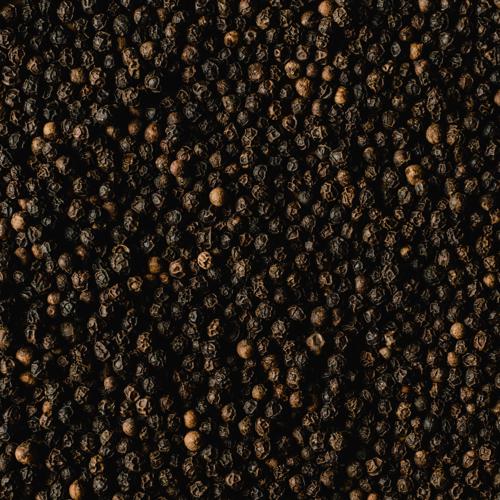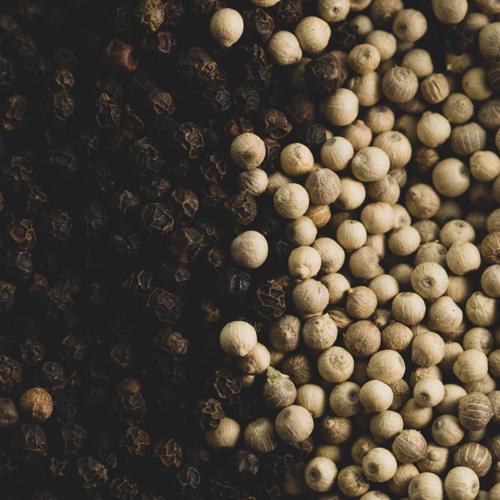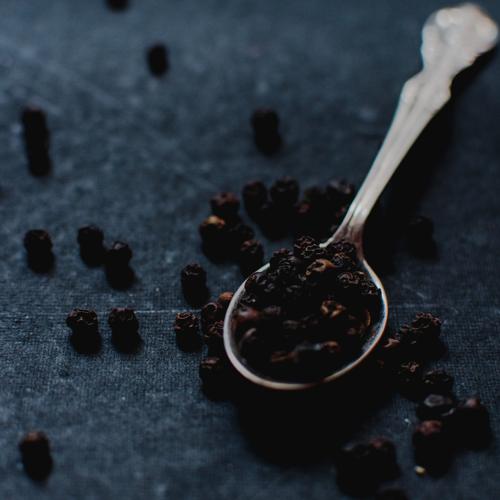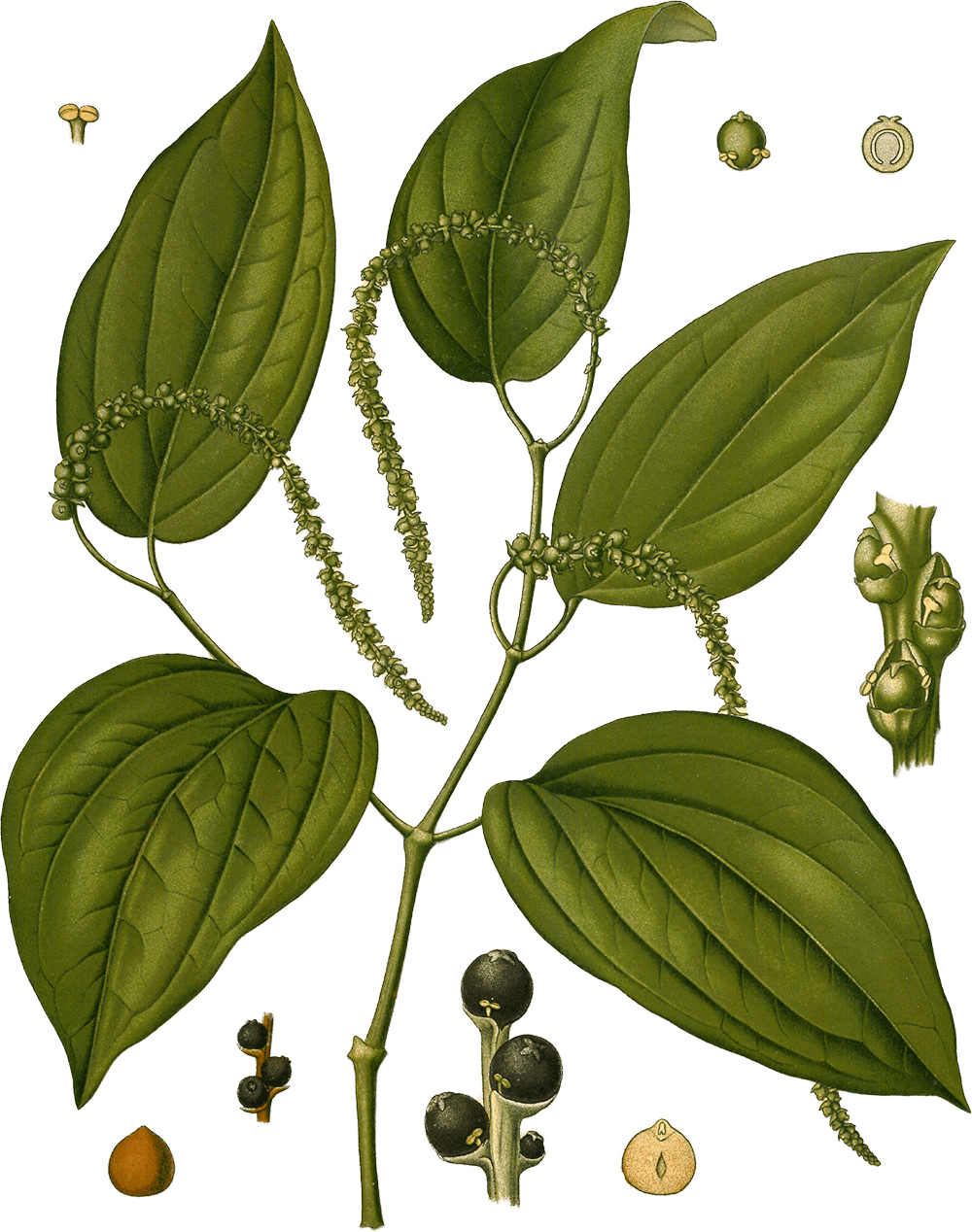Pepper
The dried fruits of an Indian vine, also known as black pepper; peppercorns. It is related to long pepper, cubeb.
English: pepper · Hungarian: bors · Arabic: فلفل · Hindi: काली मिर्च · Chinese: 胡椒
Overview
| item | pepper |
|---|---|
| taxon | Piper nigrum L. |
| family | Piperaceae |
| regions | Indian Subcontinent |
| continents | Asia-Tropical |
| part | fruit |
| cultivation | Vietnam; Brazil; Indonesia; India; Sri Lanka; etc. |
| botanical_database | POWO; GBIF; TROP; EOL |
PEPPER is a culinary, and medicinal spice, cultivated for its fruit. It is yielded from the plant Piper nigrum L., a climber in the Piperaceae family, growing in wet tropical biome, with a native range of SW. India.1
It is used primarily in flavors; colds; pepper steak; poivrade sauce; Pfefferkuchen. Its aroma is described as pungent, hot, with a heat index of 3-8.2
See more in ( Citation: POWO, 2024 POWO (2024). Plants of the world online. Facilitated by the Royal Botanic Gardens, Kew. Retrieved from http://www.plantsoftheworldonline.org/ ; Citation: Petruzzello, 2021 Petruzzello, M. (2021). List of herbs and spices. Retrieved from https://www.britannica.com/topic/list-of-herbs-and-spices-2024392 ; Citation: Wyk, 2014 Wyk, B. (2014). Culinary herbs and spices of the world. University of Chicago Press, joint publication with the Royal Botanic Gardens, Kew. ; Citation: Dalby, 2000 Dalby, A. (2000). Dangerous tastes: the story of spices. University of California Press. ; Citation: Hill, 2004 Hill, T. (2004). The contemporary encyclopedia of herbs and spices: Seasonings for the global kitchen. J. Wiley. ; Citation: Anderson, 2023 Anderson, I. (2023). The history and natural history of spices: the 5000-year search for flavour. The History Press. )
Illustration of Piper nigrum from Köhler’s Medizinal-Pflanzen ( Citation: 1887 Köhler, H. (1887). Köhler’s Medizinal-Pflanzen in naturgetreuen Abbildungen mit kurz erläuterndem Texte: Atlas zur Pharmacopoea germanica, austriaca, belgica, danica, helvetica, hungarica, rossica, suecica, Neerlandica, British pharmacopoeia, zum Codex medicamentarius, sowie zur Pharmacopoeia of the United States of America. Franz Eugen Köhler. Retrieved from https://www.biodiversitylibrary.org/bibliography/623 ) II 144.
Distribution
Native and introduced habitats of Piper nigrum3
Native areas: India
Introduced areas: Benin, Guinea, Cameroon, Gulf of Guinea Is., Ethiopia, Comoros, Mauritius, Réunion, Seychelles, China South-Central, China Southeast, Assam, Bangladesh, East Himalaya, Sri Lanka, Andaman Is., Cambodia, Laos, Nicobar Is., Thailand, Vietnam, Philippines, Vanuatu, Cook Is., Caroline Is., Marianas, Mexico Gulf, Costa Rica, Honduras, Cuba, Dominican Republic, Haiti, Leeward Is., Puerto Rico, Trinidad-Tobago, Windward Is., French Guiana, Venezuela
Bibliography
- Anderson (2023)
- Anderson, I. (2023). The history and natural history of spices: the 5000-year search for flavour. The History Press.
- Dalby (2000)
- Dalby, A. (2000). Dangerous tastes: the story of spices. University of California Press.
- Hill (2004)
- Hill, T. (2004). The contemporary encyclopedia of herbs and spices: Seasonings for the global kitchen. J. Wiley.
- Köhler (1887)
- Köhler, H. (1887). Köhler’s Medizinal-Pflanzen in naturgetreuen Abbildungen mit kurz erläuterndem Texte: Atlas zur Pharmacopoea germanica, austriaca, belgica, danica, helvetica, hungarica, rossica, suecica, Neerlandica, British pharmacopoeia, zum Codex medicamentarius, sowie zur Pharmacopoeia of the United States of America. Franz Eugen Köhler. Retrieved from https://www.biodiversitylibrary.org/bibliography/623
- Petruzzello (2021)
- Petruzzello, M. (2021). List of herbs and spices. Retrieved from https://www.britannica.com/topic/list-of-herbs-and-spices-2024392
- POWO (2024)
- POWO (2024). Plants of the world online. Facilitated by the Royal Botanic Gardens, Kew. Retrieved from http://www.plantsoftheworldonline.org/
- Wyk (2014)
- Wyk, B. (2014). Culinary herbs and spices of the world. University of Chicago Press, joint publication with the Royal Botanic Gardens, Kew.
Medicinal Spices Exhibit. (2002). UCLA Biomedical Library: History & Special Collections. https://unitproj.library.ucla.edu/biomed/spice/index.cfm?spicefilename=taste.txt&itemsuppress=yes&displayswitch=0 ↩︎



